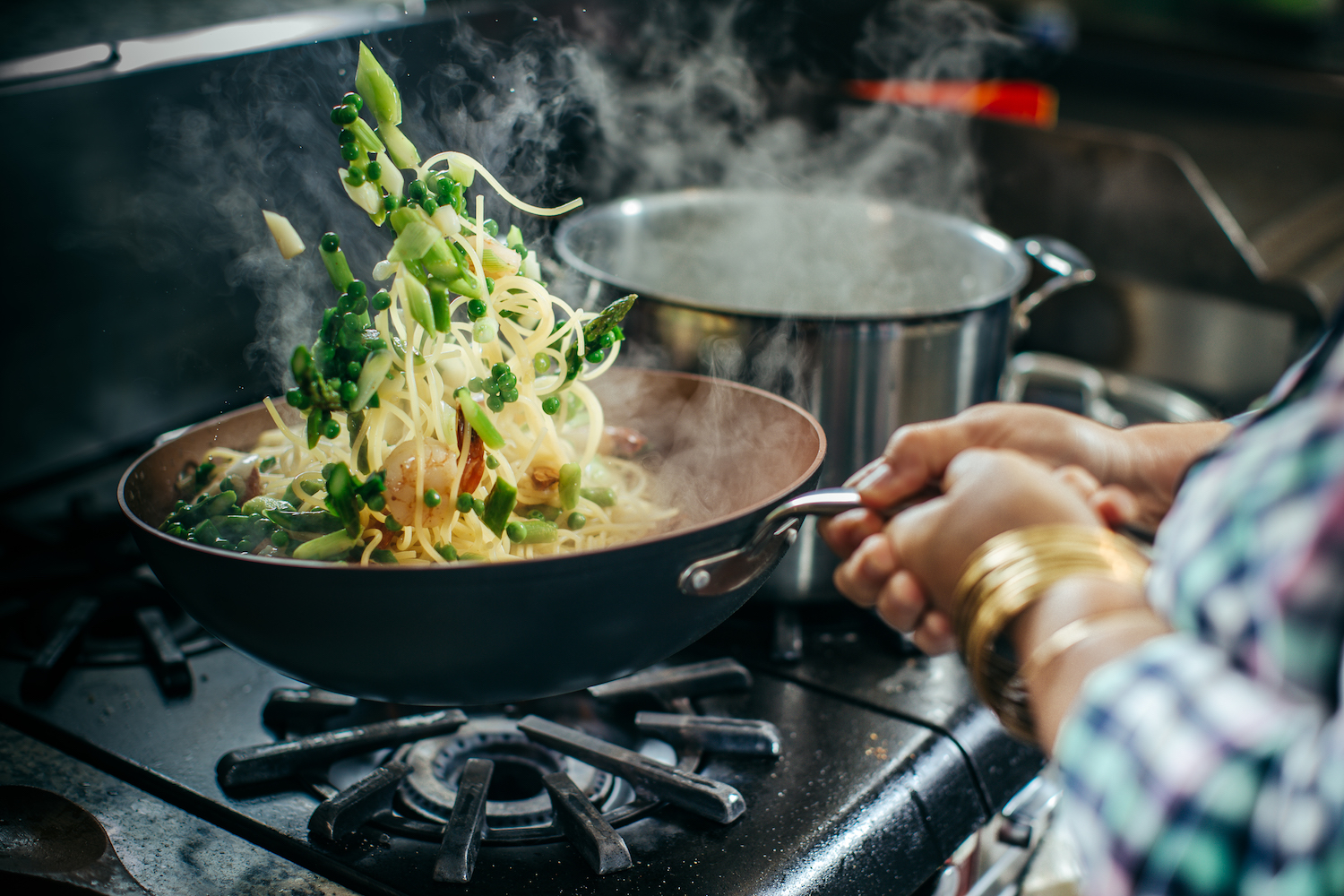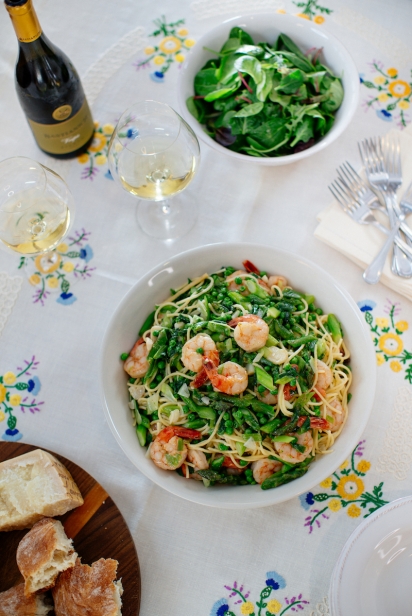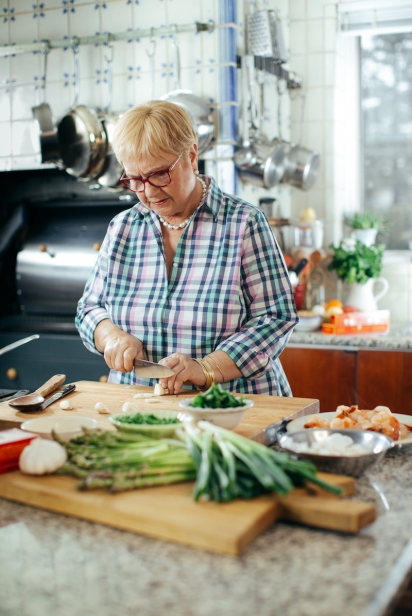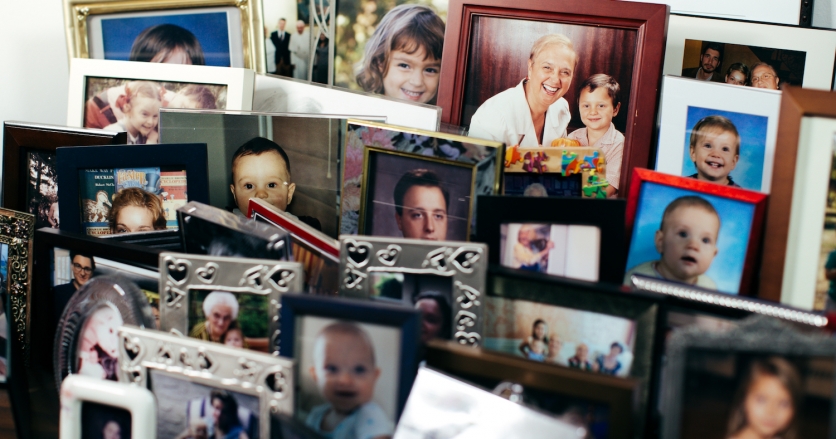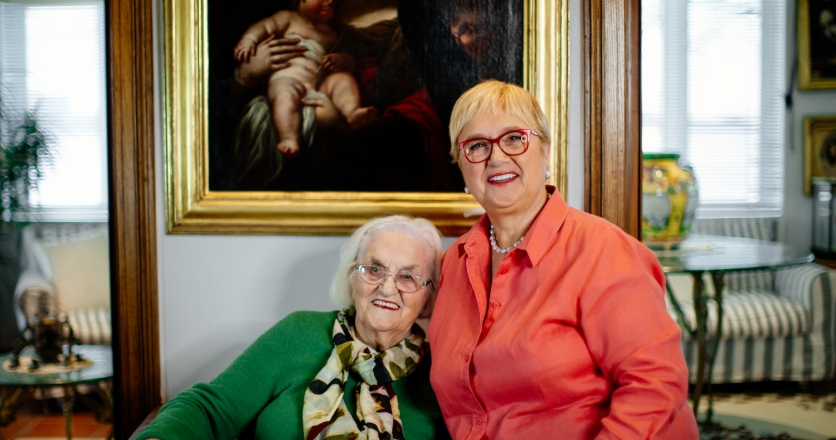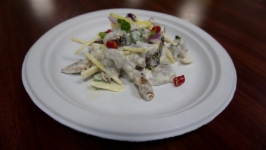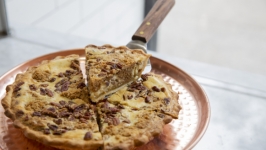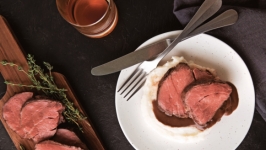Chef Lidia Bastianich
When I arrived at Lidia Bastianich’s sprawling Mediterranean-Tudor in Douglaston’s Historic District, her longtime stylist Lisa Makowski was still preening the boss: a daub of powder to the nose, a soupçon under the eyeglasses. Multiple shirt options hung on the kitchen door; an Emmy Award–winning television personality knows what shades will woo the camera.
Lidia’s home—on a peninsula extending into Little Neck Bay—is so bucolic, you almost forget you’re in New York City. Lidia says, “I just love it. It’s simple, it’s in the city … and yet, I have this this feeling of being out in the country.”
She’s just had knee replacement surgery, and filming the seventh season of her cooking series on public television, Lidia’s Kitchen, has kept her busy, in addition to her annual one-hour special on PBS, Lidia Celebrates America, which saw her traveling around America to show how families in small towns, many of them immigrants, preserve their cultural traditions through food. Lidia’s expected at an event in the city at 5pm—shaking hands, smiling for the cameras, the whole bit. She’s a nimble 72, but it’s a lot of running around at any age, and Lidia looks tired before we’ve even begun. But when a question is posed to her, Lidia subtly transforms; her cheeks appear rosier. She’s the benevolent, charming, apron-free matriarch known for the ultra- Italian catchphrase, “Tutti a tavola a mangiare!” (“Everyone to the table to eat!”)
Lidia and her family fled communist-occupied Istria and spent over two years in a refugee camp in Italy before landing in the United States in 1958. From a young age, Lidia has managed two place identities: the idyllic overseas of her early childhood, and the American dream she adopted. She’s grown a wildly successful, lifelong career out of that duality.
Once settled in Astoria, Lidia worked at Christopher Walken’s family’s bakery, then as a server at an Upper West Side pizzeria. Lidia and her former husband, Felice, worked in other restaurants for years, racking up experience and recipes before opening a place of their own in 1971.
That first restaurant, Buonovia in Forest Hills, was followed by Villa Secondo in Fresh Meadows. As the restaurants grew more popular, Lidia added regional specialties to the more typical Italian-American menus—dishes like polenta and risotto—and local food critics took notice. Her culinary education, however, began long before arriving on American soil. As she recounts in her memoir, My American Dream, some of her earliest memories are of fishing, foraging and cooking simple, rustic meals with her Nonna Rosa at her grandparents’ trattoria in the Busoler countryside.
She got Felidia, her flagship restaurant, and first foray into Manhattan up and running with children (now business partners) Joe and Tanya on her hip. A three-star New York Times review and a guest appearance on Julia Child’s show put Felidia—and Lidia— firmly on the food world atlas. Then came her television series, 11 books and Nonna Foods—a line of pastas and sauces labeled with her beaming, bespectacled face. She’s got an exclusive line of commercial cookware; restaurants in Las Vegas, Pittsburgh, Kansas City, Boston, Chicago and Los Angeles; and she’s cooked for not one, but two popes, perhaps the proudest feathers in her berreto. In “marrying” her two passions—food and family—Lidia built an empire.
Lidia arrived in Queens when she was 12 years old, and she has never left. She’d been living in a split-ranch home in Bayside for some time when the Douglaston home her viewers are familiar with came available. She’s lived in her waterfront retreat for more than 30 years now, her mother, Erminia, in a separate upstairs apartment. Lidia’s daughter Tanya lives within walking distance, and her grandbabies, now mostly college-aged, are frequent visitors.
Lidia says her mother is the most popular person in her family, and by extension, the neighborhood. Fans sometimes drive by just to catch a glimpse of her weeding and planting in the garden, which she still tends to, even at 98. “I try to be independent until I can’t,” she says, adeptly tennis-ball-hoofing a path through the house with her walker. When Lidia travels—in her absence, she leaves extra meals in the freezer for her mother—people always inquire after Nonna Erminia. The charming former educator has been a sous chef in many episodes of Lidia’s television series, and is known for her effervescent personality.
That heirloom garden, where Erminia spends so much time, is one of the residence’s defining features, where the Bastianich matriarch cultivates beans, beets, celery, fennel and eggplant. Chicories, berries, garlic and a whole consortium of peppers are planted there, and much of the fresh bounty inspires the dishes at Lidia’s restaurants.
Felidia, Becco, Del Posto and both Eataly locations may all be in Manhattan, but Lidia is a Queens loyalist. “Queens embraced me from when I was a teenager,” she said. “I came into a neighborhood in Astoria where I felt comfortable. … I was finally looking to settle, to really put roots someplace, to really feel home—and America offered me that. But still, you come in and you’re a little stranger. So Astoria offered me that kind of respite while becoming American. I still felt comfortable. I heard Italian spoken on the streets, the stores.”
“The fact is that we all feel American and we feel protected and unified in this land,” she continued, “and yet we’re allowed to be who we are ethnically. America gives you that space to be who you are, to have your clubs, to sing your songs, to speak your languages, to practice your religion, whatever.”
While Lidia’s path as an immigrant, woman and chef unfolded successfully, that’s not always the case for women, minorities and immigrants. Countless talented women chefs and restaurant workers have been cast out of kitchens after facing discrimination and sexual harassment. Lidia is a member of Les Dames D’Escoffier, and in 1993 she helped found Women Chefs and Restaurateurs—both organizations that promote women in the culinary and hospitality industry.
Lidia hasn’t publicly spoken about her longtime business partner Mario Batali, following reports that the celebrity chef sexually assaulted and harassed women. Nor about her son Joe’s complicity; a celebrity chef in his own right, he’s alleged to have fostered a “boys’ club” culture alongside Batali. Lidia’s publicist requested that I not inquire about Batali.
But does she believe the #MeToo Movement was long overdue? Yes. “... Maybe not the extreme of it,” Lidia said, “just the bringing awareness to the situation of women in the kitchen, and bringing it out there so that men and women see, you know, we are doing something wrong here.”
She continued, “That’s what brings your morale down, especially in the kitchen. If you’re demeaned, if you’re afraid to move, if you’re afraid to this [or that] ... then you’re afraid to say anything. This is what needed to be happening, opening up of this kind of knowledge for everybody to know.”
She says this minutes before going ahead to the kitchen to boil water and toss pasta with fresh asparagus and shrimp—a foraging-inspired dish served alongside a simple spinach salad. Lidia says it’s a shame I wasn’t here on the weekend, when her grandchildren were boisterously gathered around for a family meal, a regular occurrence.
The sprawling house is quiet and empty on our visit, but Lidia assures me she and her mother are by no means lonely.
Lidia Bastianich | @lidiabastianich
Lidia Celebrates America
My American Dream
Nonna Foods
Felidia | @felidianyc
Becco | @becconyc
Del Posto | @delposto
Eataly | @eatalyflatiron | @eatalydowntown
Les Dames D’Escoffier | @lesdamesny
Women Chefs and Restaurateurs


